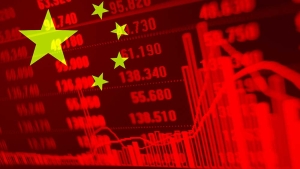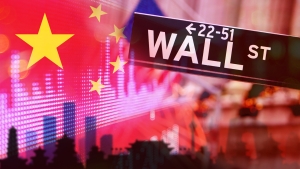China Capital Markets Research
When will capital markets in China recover?
In August, the China Securities Regulatory Commission unveiled some potential modest market reforms to strengthen investor confidence and trading in Chinese capital markets. These measures included extension to trading hours for the country’s stock and bond markets, lower transaction fees for brokers and the encouragement of share buybacks. While these measures are welcome and could help boost China’s capital markets, there are underlying economic and political issues that need to be addressed if China’s stock market is to recover definitively.
Will Chinese firms return to the U.S. for IPOs?
It was not so long ago that Chinese companies often chose the United States’ capital markets when they sought to list overseas. U.S. stock exchanges offer Chinese companies unparalleled access to a pool of global investors, as well as the prestige that comes with being listed on the New York Stock Exchange (NYSE) or Nasdaq. In addition, being able to cash out in dollars is an attractive element of a U.S. listing. However, geopolitical tensions have made listing in the U.S. more challenging for Chinese companies, while Chinese regulators are tightening oversight of market debuts outside of China, and it is unclear if and when the situation will change.
Why China is tightening restrictions on IPOs
In late August, the China Securities Regulatory Commission (CSRC) said that it would start a phased restriction on IPOs to boost "dynamic equilibrium" between investment and financing. The CSRC has not yet said how long the curbs will last, and market insiders foresee stricter IPO vetting and a longer registration process.
China may maintain its IPO market lead
2022 is a tough act to follow for China’s IPO market. Last year, about 400 firms went public on China’s exchanges, raising a record RMB 560 billion (US$80.4 billion), an increase of 3% over 2021, according to PwC. Investor appetite was strong last year amid a resilient Chinese economy, tech firms continuing to emerge, and large red-chip companies listed overseas returning to mainland stock markets. While Chinese exchanges are unlikely to equal their stellar 2022 performance this year, they still have thus far raised five times as much as their U.S. counterparts.
Are Chinese IPOs back in the U.S.?
To answer the question posed in the title, yes and no. Yes, Chinese sensor maker Hesai Group recently raised US$190 million in the largest U.S. IPO by a Chinese firm in 15 months, but it may have been a one-off event given investors are especially eager for exposure to the red-hot electric vehicle (EV) market. No, we do not think this yet portends a reversal of the slow deal pipeline for Chinese companies in U.S. capital markets. The underlying U.S.-China relationship remains too troubled for that kind of dramatic shift.
Chinese firms deepen links with European stock exchanges
Is Europe the new New York for Chinese companies keen to raise capital overseas? Not exactly, as there is no exact replacement for the capital markets opportunities that the Nasdaq and NYSE once afforded Chinese firms. But given persistent tensions in the U.S.-China relationship, Chinese companies are opting for less liquid capital markets and less prestigious overseas listings – but without any of the geopolitical drama that has come to characterize their presence on U.S. exchanges. Switzerland’s SIX, meanwhile, is fast becoming the exchange of choice for Chinese companies wanting to raise capital outside of Greater China.
Why did China’s IPO market fare well in 2022?
2022 was a year of mixed fortunes for China in many respects – but not in the case of its IPO market. Despite the trials and tribulations that the zero-Covid policy brought to China, listings on the Shanghai and Shenzhen stock exchanges hit a new high. Nearly 400 firms are estimated to have gone public on China’s exchanges in 2022, raising a record RMB 560 billion (US$80.4 billion), an increase of 3% over 2021, according to PwC.
Switzerland’s SIX continues to attract listings by Chinese companies
Historically, Chinese companies seeking to go public overseas have listed in the United States, home to the world’s most liquid capital markets. Nothing can quite compare with listing on the New York Stock Exchange (NYSE) or Nasdaq. While that remains the case, the fraught U.S.-China relationship has caused Chinese firms to turn their focus to European stock exchanges, especially Switzerland’s SIX. In Europe, Chinese companies can mostly steer clear of geopolitical tensions while still being able to access global investors.
Europe continues to attract Chinese listings
Though the U.S. and China have for now reached a stock delisting détente, Chinese firms are continuing to show interest in raising capital on European exchanges this year. As such, for the first time ever, Chinese companies have raised more in European capital markets than in the U.S., with the focus on the UK and Switzerland.
US and China make progress on averting stock delistings
While U.S.-China tensions are heated in many areas, it appears that the two countries want to keep the bilateral relationship on an even keel when it comes to the financial services sector. Despite the sensitive politics on both sides of the conversation, the two countries have, for now, reached an agreement that should reduce the chance of a large-scale delisting of Chinese companies from U.S. stock exchanges.
More...
Why are Chinese firms listing shares in Switzerland?
We have heard a lot about Chinese companies potentially delisting en masse from the U.S.’s capital markets. Without an eleventh-hour deal between the US and China, that may be inevitable. The paramount long-term trend, however, is where they will go in the first place to raise capital internationally. Hong Kong is the most obvious choice, but there are also options in Europe thanks to the establishment of stock connect programs. To that end, with the launch of the China-Switzerland Stock Connect four Chinese companies have listed on the Six Swiss Exchange.
Why is Alibaba planning a primary listing in Hong Kong?
U.S.-China financial decoupling has been happening in slow motion and sometimes appears to be leveling off, allowing some observers to stay optimistic. In reality, however, it will not be easy for American and Chinese regulators to agree on a deal that allows Chinese firms to remain listed on U.S. stock exchanges. With that in mind, Alibaba recently announced it will pursue a primary listing in Hong Kong.
The government crackdown on China’s tech sector has had many far-reaching effects, among the most consequential the reorientation of the country’s capital markets ecosystem away from consumer-facing platform companies and towards a state-guided deal pipeline focused on strategic industries. E-commerce, fintech, ride hailing and home sharing are out, while advanced manufacturing, artificial intelligence, 5G telecommunications and renewable energy are in. Big-ticket mainland IPOs are becoming more common, especially with the advent of the Shanghai STAR board, China’s answer to the Nasdaq.
How are Chinese firms’ IPOs changing?
During China’s long tech boom, private investors availed themselves of the abundant opportunities afforded by Chinese IPOs, whether onshore, in Hong Kong or in New York. Yet with Beijing’s crackdown on the tech sector and persistent U.S.-China tensions, Chinese IPOs are going in a very different direction.














